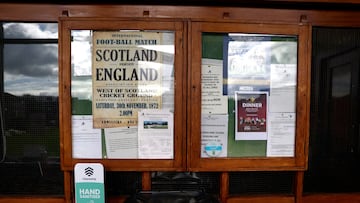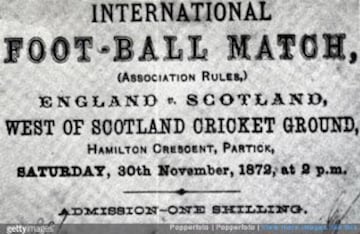SOCCER
Why do England, Scotland, Wales & Northern Ireland play as separate teams if they belong to UK?
The home nations’ role in developing football is behind FIFA’s willingness to allow them to compete as separate teams.

On Tuesday 12 September 2023, Scotland and England clash at Hampden Park, Glasgow, in the 150th Anniversary Heritage Match. The so called “special friendly” between the Scots and the Auld Enemy comes just months after the anniversary of the first ever international match played.
The United Kingdom’s status not only as the inventor of football, but also as a pioneer of the international game, is why the four members of the UK - England, Scotland, Wales and Northern Ireland - are allowed to compete as separate national teams.

150 years since England and Scotland played first ever international match
After the first universal laws of the game were drawn up by the English Football Association (FA) in 1863, the year of the body’s founding, it was England and Scotland who played what is recognised as the first ever international football match, a 0-0 draw held in Glasgow on Saturday 30 November 1872.
The Scottish Football Association (SFA) was founded the year after, followed by the Football Association of Wales (FAW) in 1876 and the Irish Football Association (IFA) in 1880 - and starting in 1884, the four nations, who at the time featured a pre-partition Ireland, then began facing each other on a yearly basis in what was initially called the British International Championship (later the British Home Championship).
“The whole idea of nations playing against each other actually really comes from Britain […],” Soccernomics co-author and University of Michigan professor Stefan Szymanski told an interview with Business Insider in 2018. “Only at the very end of the 19th century do other countries start to play.”
What’s more, British influence over the then-nascent game was further solidified in 1886, when the four home nations’ FAs came together to form the International Football Association Board (IFAB), a body responsible to this day for devising and approving changes to the laws of the game. (While the British quartet are no longer IFAB’s sole members, they continue to wield enough power between them to block potential new laws.)
Home nations allowed to remain separate when FIFA founded
All of which meant that by the time FIFA was established in 1904, it was felt the UK’s national associations were too powerful to be forced to combine into one, at the same time as there was an acceptance that their involvement was essential to the credibility of the newly-created world governing body.
“For FIFA, British membership was deemed vital for a federation claiming to represent the interests of a world game invented and developed in Britain,” Kingston University professor Peter J Beck said in a 1999 paper published on the FIFA website.
The FA, SFA, FAW and IFA - the latter seeing its governing powers limited to Northern Irish football after Ireland’s partition in 1921 - had all joined FIFA by 1911. Over the next three and a half decades they then twice left and returned to the organisation en masse, finally becoming members for good in 1946.
Special status enshrined in FIFA’s statutes
The home nations’ exceptional status as separate footballing countries has had to be written into FIFA’s statutes. To be a FIFA member and, in turn, gain permission to compete as a FIFA-recognised country, the current regulations state that a nation’s football association must first be a part of its regional confederation - in this case, UEFA, the European game’s governing body. All four are, but FIFA adds in article 11, paragraph 1: “Only one association shall be recognised as a member association in each country.” Given that FIFA goes on to define “country” as “an independent state recognised by the international community”, this would present a problem for England, Scotland, Wales and Northern Ireland were they not given a get-out from such a stipulation.
After all, though the United Kingdom refers to itself as a union of four different countries, none of them are internationally-recognised independent states; that description only applies to the UK as a whole. Thankfully for the FA, SFA, FAW and IFA, FIFA’s statutes add that article 11, paragraph 1 is subject to article 11, paragraph 5, which states: “Each of the four British associations shall be recognised as a separate member association of FIFA.”
UK team has competed at Olympics - but only once in last 60 years
The UK has fielded a combined men’s team in the Olympics football tournament on 10 occasions, most recently in 2012. However, that’s the only time it has happened since 1960, amid British concerns that it could be used as a precedent to force the home nations to play as one in all competitions. This is particularly true of the three smaller UK nations, Scotland, Wales and Northern Ireland, not least because of the likelihood of an England-centric UK team. At the 2012 Olympics, 13 of the 18 men’s-squad members were English.
For all four UK countries, their national football teams are a significant outlet for expressing their individual identities - but, again, this is especially the case of Scotland, Wales and Northern Ireland. “England have maintained political power over the other home nations within the UK throughout history and international football has often been the site for Celtic resistance to such oppression,” writes Tom Gibbons in the book English National Identity and Football Fan Culture: Who Are Ya?. Given that Scotland, Wales and Northern Ireland have in recent years gained greater power for self-government in devolved assemblies, a combined British national team would be politically at odds with this trend towards decentralisation.
Indeed, Szymanski even believes it would contribute to the break-up of the UK. “I would go as far to say, if FIFA actually did ever force Britain to field a single team, rather than have four home nations, the Scots would actually demand independence,” he told Business Insider in 2016. “They had an independence referendum a couple of years ago [in 2014], which they lost narrowly, it would be overwhelmingly in favor of independence if they lost their soccer team, because that’s the only way they’d get their soccer team back. And that would be easily important enough to the Scots, I have no doubt about that in my mind.” Brexit may have made that idea inevitable anyway.
FIFA president Gianni Infantino has assured the British football associations that Team GB’s involvement in the men’s Olympic tournament “would certainly not jeopardise in any way whatsoever 130, 140, 150 years of history of the four home nations”, but nonetheless the UK did not enter Rio 2016 or this summer’s delayed Tokyo Games. A British women’s team did play in Japan, however.





